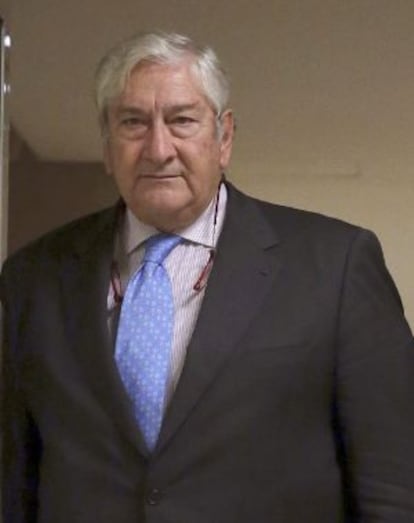Madrid health chief: “You don’t need a master’s to put the protective suit on”
Javier Rodríguez still believes nursing assistant infected with Ebola hid information

Madrid regional health chief Javier Rodríguez has described his choice of words on Wednesday when he accused Ebola victim Teresa Romero of having lied to doctors about her state of health as “somewhat unfortunate.”
But he reiterated his belief that the nursing assistant, who is the first person to contract the virus outside of West Africa, could have hidden information from medical staff regarding her possible contact with the virus while working as part of the team treating two Spanish missionaries with Ebola at the Carlos III Hospital in Madrid.
Speaking on the Cadena SER network, Rodríguez said on Thursday morning that the prevention team at Carlos III took no measures when Romero called to tell them she was running a fever because the protocols state there is only “need for alarm” when the patient is running a temperature over 38.6ºC, and she did not say that she could “have had that contact” with the virus.
Rodríguez also spoke about the responsibilities of the Popular Party-run regional government, saying the administration would have to be changed “every two days” were it to be held responsible for all medical actions carried out by the Madrid health service. He also assured listeners that “if I have to resign, I will resign,” adding that he “came into politics with my affairs already in order.” He emphasized that he was not “bound” to his position within the regional government given that he is a doctor, and “fortunately” he has his “life all sorted out.”
None of those who treated the first missionary has been infected. The suit seems to have worked perfectly”
The health chief questioned why the nursing assistant did not tell her family doctor that she had treated one of the missionaries. On Wednesday Romero admitted she could have touched her face with a glove after having entered the room of one of the Ebola-infected missionaries. Rodríguez concluded that he had “proof” that the woman had not given out all the information that she had.
He later appeared on a morning current affairs show on Spanish TV channel Telecinco, during which he spoke further about the actions of the nursing assistant. “You don’t need a masters’ degree to explain to someone how you should put on or take off a [protective suit],” he told the hosts of the Ana Rosa show. “But some people have a greater ability to learn than others. […] The suits have been worn by doctors, nurses, ambulance crews … and there has been no problem. I don’t know whether there are more sophisticated suits but none of those who treated the first patient [one of the missionaries] has been infected, meaning that the suit was protecting them and they are the same suits that were used in the second case. The suit seems to have worked perfectly.”
During his interview on Cadena SER, Rodríguez also explained that his department was checking who was in charge of procedural checks at the time the nursing assistant was thought to have been infected with Ebola. He said that if he had to assume responsibility for any lack of controls, he would do so. The health chief also stated that he had ordered an investigation into a letter sent by a doctor at the Carlos III Hospital who treated Romero complaining of a lack of resources.
The Madrid health chief’s statements drew a quick response. The Association for the Defense of Public Health in Madrid (Adspm) has called for him to resign, describing Rodríguez as “incapable” of dealing with the crisis. The association added that if he were to stay in the role, he would be putting the health of the public at “serious risk.” Adspm also accused Rodríguez of “trying to shift” the blame for the crisis on to someone who is seriously ill, “due to her voluntary willingness to treat a patient with a high risk of contagion despite not having had a lot of training.”
Tu suscripción se está usando en otro dispositivo
¿Quieres añadir otro usuario a tu suscripción?
Si continúas leyendo en este dispositivo, no se podrá leer en el otro.
FlechaTu suscripción se está usando en otro dispositivo y solo puedes acceder a EL PAÍS desde un dispositivo a la vez.
Si quieres compartir tu cuenta, cambia tu suscripción a la modalidad Premium, así podrás añadir otro usuario. Cada uno accederá con su propia cuenta de email, lo que os permitirá personalizar vuestra experiencia en EL PAÍS.
¿Tienes una suscripción de empresa? Accede aquí para contratar más cuentas.
En el caso de no saber quién está usando tu cuenta, te recomendamos cambiar tu contraseña aquí.
Si decides continuar compartiendo tu cuenta, este mensaje se mostrará en tu dispositivo y en el de la otra persona que está usando tu cuenta de forma indefinida, afectando a tu experiencia de lectura. Puedes consultar aquí los términos y condiciones de la suscripción digital.








































